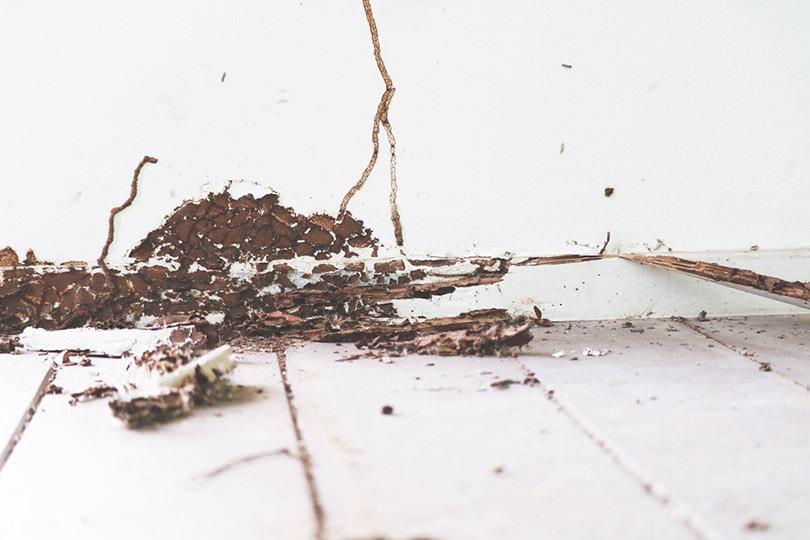Does Homeowners Insurance Cover Termite Damage? Signs, Facts, & FAQ
-
Brooke Bundy
- Last updated:
Fires and thieves are covered under your homeowner’s policy, but what about your unwelcome pest guests? Although they can cause significant damage to your home, termites actually aren’t covered by your homeowner’s policy because they aren’t considered a sudden accident, such as a tree falling through your roof. We’ll talk more about what is and isn’t included in your policy, as well as cost-effective ways of preventing termites from ruining your home.
Why Termites Probably Aren’t Included in Your Policy
It’s hard to generalize homeowners’ insurance coverage because there are many exceptions. For example, your policy will cover lightning strikes but won’t pay for flood damage (that’s what flood insurance is for). They’ll even pay for mold that results from a busted water heater, but they won’t cover remediation costs if it’s due to flooding.
Homeowners insurance is mostly to protect your home from mechanical issues or injuries that aren’t caused by humans who live there, such as your air conditioning unit dying, or your Amazon delivery driver spraining their ankle because they tripped up your porch step. However, every policy differs, so you should ask your insurance company specific questions to see exactly what’s covered and what isn’t. For example, some companies might cover dog bites, but others won’t, or will restrict coverage to certain breeds.
Termites aren’t covered in any event because they aren’t considered a sudden emergency, such as a burst pipe, or a liability. In fact, by the time termite damage is discovered, it’s likely that they’ve already caused significant structural damage.

How To Catch Termites Before They Chew Through Your Home
If termites are taking residence in your home, you might first spot the pests themselves, or you might find damage such as chewed wood.
- Termites look similar to carpenter ants—which are also hazardous to the wooden structures in your home. Both have wings, but carpenter ants have large black bodies while termites have yellow bodies. Termites have straight antennae and two sets of identical wings.
- Wood shavings. Termites typically leave a wood shaving trail where they work, so look for sawdust.
- Termite “tunnels.” These pests build termite “tunnels” out of mud which they’ll use to travel.
- Carved wood. They leave small lines on wooden structures that look like a maze. These can be on parts of the house, such as the floor and baseboards, or on furniture such as rocking chairs.
- Buckling floors. As they chew through your flooring, some pieces may warp and buckle, especially if they’re munching on the support beams. If your house is older, there’s an increased chance your foundation might be wooden, so you’ll need to act fast to avoid extremely costly foundation repairs.
- Peeling paint. If your house hasn’t had water damage, peeling paint might be a sign of termites.

What Is a Termite Bond? Is It Worth It?
Considering the possible costs a homeowner may face if their house is plagued with termites, you might want to buy a termite bond to protect your home from an invasion.
A termite bond is a contract between you and the pest control company. You agree to pay them a set amount for the contract, typically between $300 and $1,000 a year, for a set amount of time. During that time, the company agrees to come out to your house and inspect for termites. This guarantees that your home is free of termites or allows you to make quick decisions regarding termite remediation before the damage gets out of hand. The specifics vary depending on the contract. Some termite bonds will pay for damage repairs, but others will just treat your home for termites as a prevention measure.
Homeowners who are trying to sell their home shortly, have a house with a wooden foundation, or have had a history of termite damage, typically find a termite bond worth their money. A termite inspection is a vital part of guaranteeing some loans, especially VA and FHA, so potential buyers may turn down a house or demand termite repairs before closing if the home inspector finds termite damage. Just make sure the bond is transferable before you sign so you can switch it to your new place after you move.

Conclusion
It’s important to spot termites early on, especially if your house has a wooden foundation that can lead to costly repairs down the road. Your homeowner’s insurance doesn’t consider termites to be an active emergency such as a malfunctioning water heater, so they won’t pay for termite remediation or repairs. It’s up to you to find the pests before they can damage your home, so you might want to buy a termite bond to help.
Featured Image Credit: Rawpixel.com, Shutterstock
Contents

